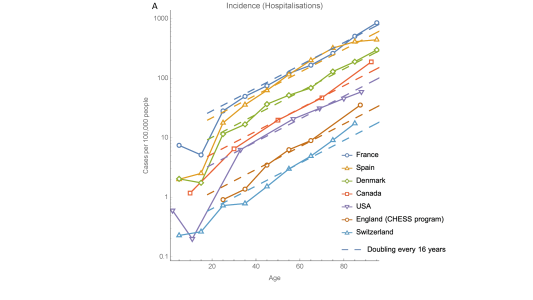One of the great puzzles of the current COVID-19 crisis is the observation that older people have a much higher risk of becoming seriously ill. While it is usually commonly accepted that the immune system fails progressively with age, the actual mechanism leading to this effect was not fully understood. In a recent work, Sam Palmer from Oxford Mathematics and his colleagues in Cambridge have proposed a simple and elegant solution to this puzzle. They focussed their attention on the thymus where T-cells, partially responsible for the body’s immune response, develop. Observational data show that the thymus shrinks in time, losing about 4.5% of its volume every year in adulthood. Remarkably, this decay correlates with the increase in risk with age. Indeed, many infectious diseases and cancer types have risk profiles that rise by the same 4.5% every year - that’s an exponential increase with a doubling time of 16 years. In their paper, they showed that COVID-19 hospitalisations follow the same trend with an increase of about 4.5% per year between age groups, suggesting that the main effect may be due to thymic function.
Another puzzle emerging from the data is that men have a systematic greater risk of hospitalisation and death. Again, the authors show that the answer may lie in the thymus as it is known that men have lower T-cell production.
What about the children who, thankfully, have been mostly spared? It turns out that the immune system for children under 20 years of age is very different than the one found in adults. It does not follow the same law of exponential decrease. The statistical analysis of this younger cohort shows that they are as likely to get infected, but they have a much lower probability of disease progression than what would be predicted from strong thymus function alone. A possible explanation of this observation is that this age group may be more protected due to cross-protection from common cold viruses, which they get more often than adults.
This research tying observational data with mechanistic models of the immune system is crucial in our understanding of COVID-19 and in our quest for therapeutic targets. Find out more about this work which was carried out with Ruairi Donnelly and Nik Cunniffe from University of Cambridge.


